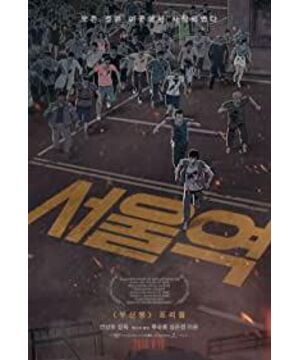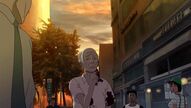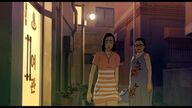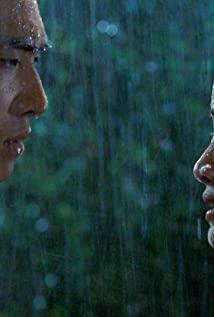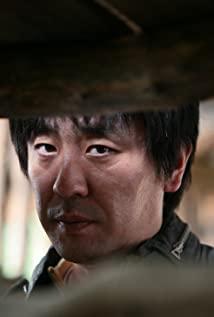a sister chapter of "Travel to Busan", "Seoul Station" failed to meet the expectations of hungry audiences, who are eager to once again participate in a "travel to Busan" with ups and downs in the plot, in that imaginary world where zombies are spreading Take care of yourself and enjoy the thrill of the rest of your life. However, "Seoul Station" is not "Travel to Busan" after all, and Yan Shanghao would not use the same method to shoot the same subject twice. In his bones, Yan Shanghao is still the angry young man, or the "king of pigs", "Seoul Station" It was his proactive "repair" of "Travel to Busan" that was too cynic, and it was also an instinctive expression of his style return.
In my opinion, "Seoul Station" is obviously better than "Travel to Busan" for the following three reasons.
One is to no longer apply the plot of Hollywood disaster films to promote routines. In traditional zombie movies, there is no essential difference between zombies and monsters, aliens, or aliens (the same applies when zombies are replaced by dinosaurs in "Busan Tour"). They are all aliens that threaten the safety of the human world. Most zombie movies also They are all showing the struggle ("Dawn of the Living Dead"), growth ("The Walking Dead") or redemption ("Busan Tour") during the escape of human beings. More zombie movies are squandering blood plasma, creating horror, and being marked as horror films. Logo, long-term sinking in the swamp of the B-level film. In these zombie movies, there is a binary structure of humans and zombies ("Busan Tour" is no exception), and the boundaries between right and wrong, good and evil are clear. The audience expects that human beings as the incarnation of justice will eventually defeat the zombies as the incarnation of evil, which corresponds to the audience's psychology. To a certain extent, to satisfy the audience’s self-identity of values.
"Seoul Station" completely jumped out of the inherent routines of European and American zombie movies, breaking the binary opposition structure of good and evil. Sometimes the horror does not come from zombies, but the indifference between people, those who occupy medical and health stations. , The boyfriend who provided pimping services for his girlfriend, the armed police who shot and killed the homeless in the quarantine area, and the creditor named Father Shilai to collect his debts were the main driving force for the development of the plot and the real source of the escape mode of mankind. . "Seoul Station" has constructed a world in which the boundaries between good and evil are unclear and the enemy is indistinguishable, so that the heroine who ends up with all thoughts turned into a zombie, and in turn abuses the creditor, changing her posture from "male to female" to "female to male" Down", on the contrary, there is a pleasure of revenge. However, the subtitles were pulled up, and the pleasure quickly dissipated, lingering, but there was nowhere to put sadness.
Second, the intensity of reality criticism continues Yan Shanghao's consistent style. Twenty minutes before the film, the director showed the homeless tramp all over the subway corridors, the heroine who was driven out of the house by the landlord into the underground passage, and was forced to pimp his girlfriend in the dark corner of the Internet cafe to make a living. Boyfriend. At the same time, public utilities such as health aid stations and police stations are more like tools to maintain social class and established order. The police department is worried about how to prevent homeless riots, but is indifferent to the reasonable demands of homeless people. Under the guise of humanitarianism, the rescue of the lower-class people seems to be very different. What the audience sees is that two naturally isolated physical spaces are formed underground and on the ground, opposing each other and refusing to flow. What is more terrifying is the numbness and indifference between the lower classes, and people are like walking dead.
If the setting of "zombies" is removed, the class and the gap between rich and poor portrayed in "Seoul Station" are almost infinitely close to the real world, making it easy to think of the recently discussed "Beijing Folding" and "Ants in the Flourishing Age" . Therefore, in my opinion, what many viewers cannot bear is not that the difference between "Seoul Station" and the real world causes sensory discomfort, but that there is no difference between the two.
In "Travel to Busan", the audience is very clear about the boundary between "us" and "them" (the audience and the people in the movie, or humans and zombies). "They" are still far away from the real life of "us". The line in "Standing" is blurred. The audience has to abandon the original safe distance of the bystander, and is forced to admit that we are actually living in the imaginary of peace, the explicit class order in the movie, and nowhere to escape. Formal discrimination, oppression, and indifference are more terrifying than zombies cannibalism. It is not as good as being infected by zombies as in the end, becoming a zombie, and completely revolutionizing.
In this sense, "Travel to Busan" is more like a fictitious "island". It gives the audience an illusion of safety. Humans can retreat from the surrounding layers of zombies. It is essentially Western-style. Capitalist; while "Seoul Station" refers directly to the pain of the heart, the army's shooting of innocent people, religion is unable to shelter the weak, and the heroine escapes from the death of zombies but cannot escape the pursuit of the creditor. I have been thinking Having a residence (home), she died in the model room of the sales center, transforming into a wandering corpse that could never go home. Everything is a mirage! ——This complements the ending of "The King of Pigs".
The third is the director's dystopian diligence. The zombie culture in Europe and America emerged during the Cold War (George Romero’s Zombie Trilogy from 1968 to 1979). The Western world believes that the socialist camp is not only economically backward, but also ideologically in a state of ignorance. , The threat of collective unconscious group invasion, so the evil "zombie" has become the collective imagination of the West for the East. After the end of the Cold War, the threat from the East gradually disappeared, and the vitality of the zombie culture went from bad to worse, and even disappeared.
The resurgence of "Travel to Busan" and zombie movies in South Korea is probably related to the fact that South Korea is still threatened by the totalitarian society of North Korea. They believe that the North Korean people are constrained by a compulsory totalitarian system, lack of character, emotional exhaustion, and annihilation of humanity. They are extremely narcissistic after the destruction of their "self", hoping to turn everyone into their own kind. This is exactly the same as that of the "zombie". The characteristics coincide with each other, so "zombies" can easily become the collective imagination of the South Korean people about North Korea. If only this point is emphasized, it is enough for Yeon Sangho to shoot "Travel to Busan", and there is no need to film another "Seoul Station" to see and listen.
In fact, Yeon Sang-ho wants to tell the audience through "Seoul Station" that if zombies/totalitarianism are evil, then class/capitalism is the bigger evil. The most terrifying thing in "Seoul Station" is not the zombies, but the impermeable wall created by capitalism that separates classes and people's hearts. Isn't this a capitalist utopia? How is it different from "Animal Farm", "The Matrix" and "Snow Country Train" described by George Orwell, Andy Wachowski and Bong Junho?
In "The King of Pigs", Yan Shanghao once gave the anti-utopia antidote-the oppressed took up weapons and used violence to control violence, but it was in vain; in "Seoul Station", Yan Shanghao did not give up, The dystopian "magic bullet" is used again to turn the heroine and the entire bottom society into zombies and become the "accomplices" of totalitarianism to resist the violence of men, the state apparatus and the bourgeoisie. This is more like a well-designed one. , Ambitious violent revolution? It's just that the audience is not ready.
"Iris" Public Account
View more about Seoul Station reviews


